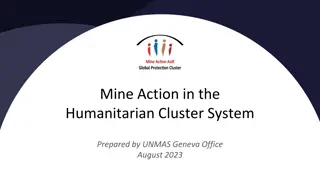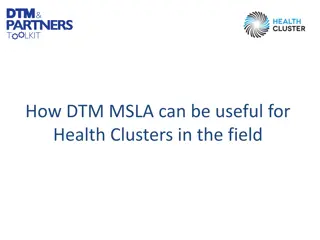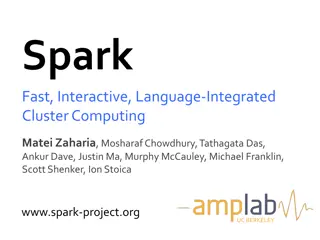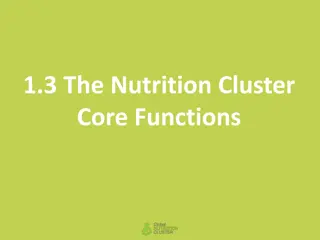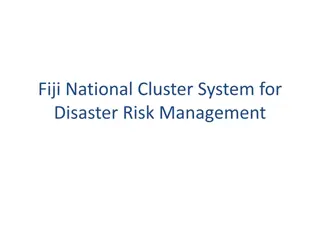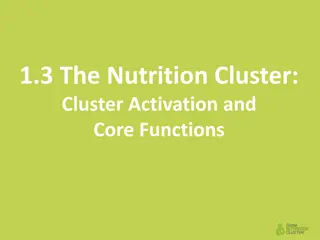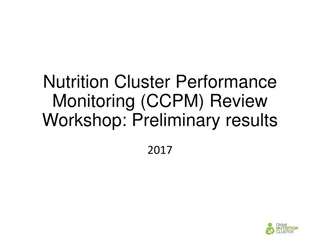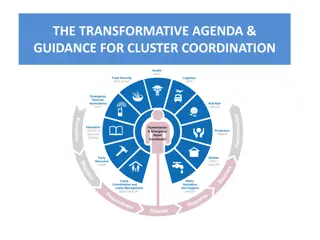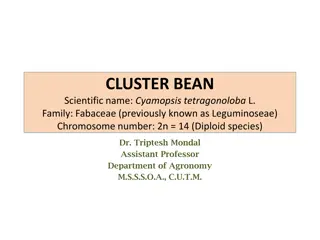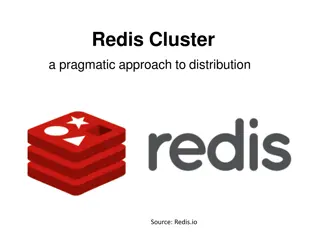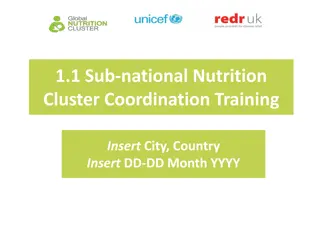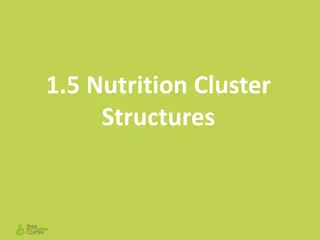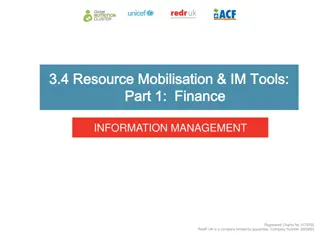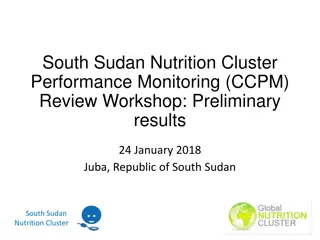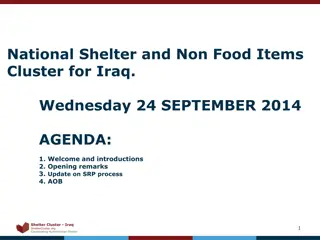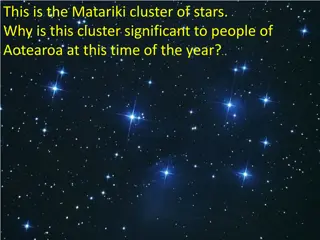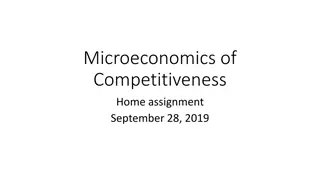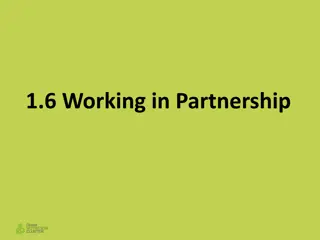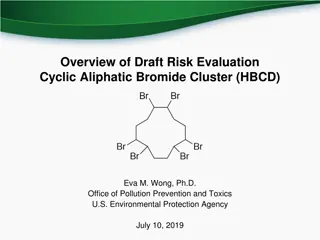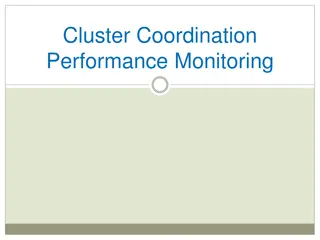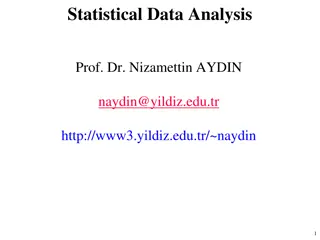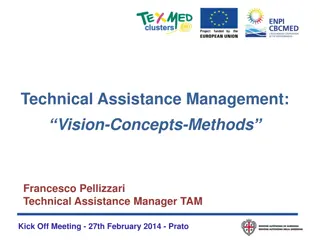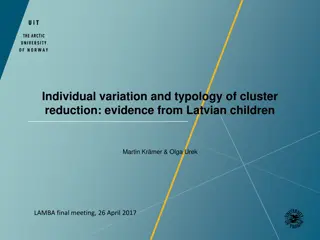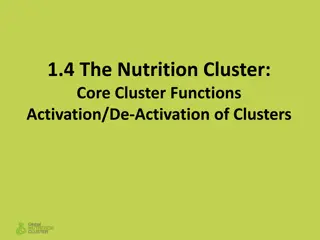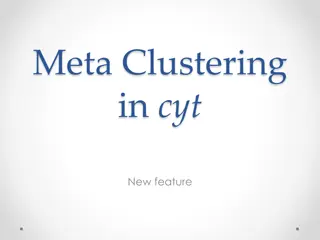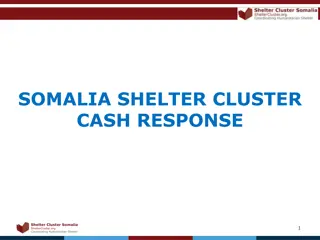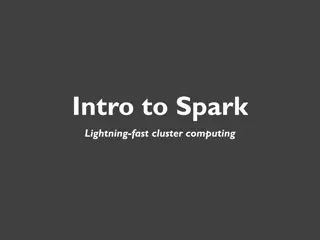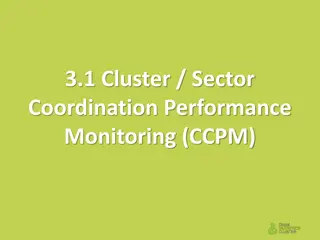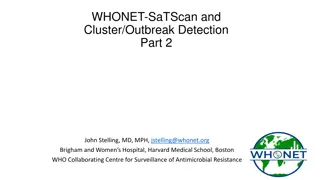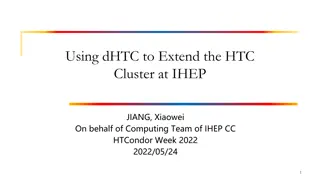Mine Action in the Humanitarian Cluster System
The Inter-Agency Standing Committee (IASC) plays a crucial role in coordinating humanitarian efforts, with a focus on mine action in the global protection cluster. This involves clear responsibilities, strategic planning, and advocacy to address humanitarian needs. The IASC Reference Module for Clus
3 views • 18 slides
Utilizing DTM MSLA for Enhanced Healthcare Cluster Management
DTM MSLA, a crucial tool in health cluster management, facilitates tracking of mobility and cross-sectoral needs, especially in emergency events and displacement situations. The DTM components, focusing on flow monitoring and registration surveys, enable effective data gathering and beneficiary targ
0 views • 34 slides
Overview of DSW End Point Assessment Team Leader Level 3
DSW End Point Assessment Team Leader Level 3 provides a clear understanding of the assessment process, ensuring individuals comprehend why and when it occurs, responsibilities involved, and how DSW supports them. It covers topics such as what End Point Assessment entails, assessment design and deliv
2 views • 18 slides
Understanding Apache Spark: Fast, Interactive, Cluster Computing
Apache Spark, developed by Matei Zaharia and team at UC Berkeley, aims to enhance cluster computing by supporting iterative algorithms, interactive data mining, and programmability through integration with Scala. The motivation behind Spark's Resilient Distributed Datasets (RDDs) is to efficiently r
0 views • 41 slides
Wood Innovation Cluster: Driving Regional Growth and Development in the Wood Industry
The Wood Innovation Cluster, established in 2018 in Skellefte municipality, brings together key stakeholders in the wood industry to foster regional growth and development. It coordinates research, development, education, and testing activities while promoting sustainable procurement. Through collab
0 views • 4 slides
Nutrition Cluster Core Functions Overview
The content provides a detailed overview of the core functions of the Nutrition Cluster, focusing on objectives, core functions, group work activities, and explanations on supporting service delivery, informing strategic decision-making, and advocacy. It highlights the importance of cluster coordina
1 views • 19 slides
Fiji National Cluster System for Disaster Risk Management
The Fiji National Cluster System for Disaster Risk Management emphasizes the importance of coordination in emergencies, aiming to reduce gaps and overlaps through a coherent, complementary approach. Global Cluster coordination systems have been adopted to enhance collaboration among various humanita
1 views • 22 slides
Guidelines for Media Reporting on Gender-Based Violence: Roles and Functions of GBV Sub-Cluster
Comprehensive guidelines for media reporting on Gender-Based Violence (GBV) covering the roles and responsibilities of the GBV Sub-Cluster, the coordination structure, functions of the GBV Sub-Cluster, and basic concepts of GBV including different forms of violence. The document emphasizes the impor
2 views • 36 slides
Inter-Cluster Coordination and Information Management in Humanitarian Emergencies
Inter-Cluster Coordination and Information Management play vital roles in humanitarian emergencies. The coordination mechanism involves regular meetings convened by the RC/HC and coordinated by OCHA, providing opportunities for clusters to collaborate on shared planning, needs assessments, and poole
3 views • 13 slides
Understanding the Nutrition Cluster Activation and Core Functions
Exploring Level 3 emergencies, the process of cluster activation and deactivation, and the core functions of the Nutrition Cluster at the country level. Learn about the criteria for cluster activation, gaps in response, and the strategic approach to humanitarian system-wide emergency activation. Dis
3 views • 21 slides
Nutrition Cluster Performance Monitoring (CCPM) Review Workshop Preliminary Results 2017
The Nutrition Cluster Performance Monitoring (CCPM) aims to ensure efficient coordination, identify areas for improvement, raise support awareness, and enhance transparency within the cluster. The process involves planning, conducting surveys, analysis, action planning, and monitoring. It does not m
1 views • 14 slides
Transformative Agenda and Guidance for Effective Cluster Coordination
Explore the transformative agenda and guidance for cluster coordination, emphasizing the roles of UNICEF as a cluster lead agency, core cluster functions, inter-cluster coordination, and management strategies for effective humanitarian response. Key focus areas include accountability, human financin
1 views • 19 slides
Overview of Cluster Bean (Cyamopsis tetragonoloba L.) - Uses, Distribution, and Classification
Cluster beans, scientifically known as Cyamopsis tetragonoloba L., are valuable leguminous crops with economic importance due to their drought tolerance and industrial applications, particularly in gum production. They are cultivated for feed, fodder, and vegetable purposes, with their seeds rich in
5 views • 14 slides
Understanding Redis Cluster Distribution Approach
Redis Cluster offers a pragmatic approach to distribution, connecting all nodes directly with a service channel. Each node communicates using a binary protocol, optimized for bandwidth and speed. Nodes do not proxy queries, and communication involves messages like PING, PONG, and Gossip. Hash slot k
0 views • 17 slides
Sub-national Nutrition Cluster Coordination Training Workshop
Welcome to the Sub-national Nutrition Cluster Coordination Training Workshop aimed at sharing key concepts, tools, and approaches for effective coordination of nutrition in emergencies. This training prepares participants for working in Nutrition Cluster/Sector Coordination, promoting dialogue and s
1 views • 10 slides
Understanding Nutrition Cluster Structures and Roles
Learn about the structures and roles within Nutrition Clusters at different levels, including the responsibilities of key actors such as the Cluster Coordinator, Information Manager, Strategic Advisory Group, and Technical Working Groups. Explore the involvement of governmental and non-governmental
0 views • 27 slides
Humanitarian Resource Mobilisation and Information Management Tools
The content discusses the role of Information Management Officers (IMOs) and Cluster Coordinators in resource mobilization within humanitarian settings. It emphasizes the importance of tools such as financial tracking systems, capacity mapping, and checklists in informing the resource mobilization s
0 views • 13 slides
Review of South Sudan Nutrition Cluster Performance Monitoring Workshop
Preliminary results from the South Sudan Nutrition Cluster Performance Monitoring (CCPM) Review Workshop held in Juba, Republic of South Sudan on 24th January 2018. The workshop aimed to ensure efficient coordination, identify areas for improvement, raise awareness of support needed, and strengthen
0 views • 18 slides
National Shelter and Non-Food Items Cluster for Iraq - Summary and Data Overview
The National Shelter and Non-Food Items Cluster meeting in Iraq on Wednesday, 24th September 2014 discussed various important agenda items including updates on the SRP process, strategic objectives, overview of cluster projects, types of assistance provided, and targeting vulnerable groups. A total
0 views • 7 slides
Understanding the Significance of Matariki Cluster in Aotearoa
Matariki, the cluster of stars, holds cultural importance in Aotearoa during this time of the year. As the tohunga, recognizing these seven stars and understanding the various ways to organize and locate Matariki is essential. It rises just before dawn, and identifying it involves looking for specif
0 views • 9 slides
Understanding Higher Education Assessment: The Complete Guide
Higher education assessment involves a systematic process of collecting, reviewing, and utilizing information to improve student learning and development. This guide covers the assessment cycle, learning outcomes, the mission behind assessment in higher education, what assessment is and is not, reas
1 views • 36 slides
Overview of Environmental Impact Assessment and Strategic Environmental Assessment Directives
Environmental Impact Assessment (EIA) and Strategic Environmental Assessment (SEA) play crucial roles in evaluating the impact of planned activities on the environment. This content delves into the concept, origins, development, and key elements of environmental assessment, discussing the legal fram
2 views • 35 slides
Dutch Flower Cluster Competitiveness Analysis
Analyze the Dutch flower cluster's competitiveness through questions on its structure, sustainability, internationalization, and challenges. The report must focus on the reasons behind the cluster's success, its connections to global flower clusters, and recommendations for key stakeholders.
0 views • 5 slides
Institutional Assessment and Effectiveness Workshop Achievements at SUNY Oneonta
The Office of Institutional Assessment and Effectiveness at SUNY Oneonta has made significant progress in developing assessment protocols and processes, leading to a culture of assessment. This includes completing planning and assessment cycles, establishing objectives and procedures, and aligning u
2 views • 16 slides
Understanding K-means Clustering for Image Segmentation
Dive into the world of K-means clustering for pixel-wise image segmentation in the RGB color space. Learn the steps involved, from making copies of the original image to initializing cluster centers and finding the closest cluster for each pixel based on color distances. Explore different seeding me
0 views • 21 slides
Nutrition Cluster Partnership Essentials
Discover the minimum commitments for engaging in the Nutrition Cluster, learn about partnership principles, and understand how these guide collaborative efforts within the cluster. Explore partner commitments, principles of partnership, and engage in an exercise to apply these concepts practically.
0 views • 7 slides
Overview of Draft Risk Evaluation for Cyclic Aliphatic Bromide Cluster (HBCD)
The overview discusses the draft risk evaluation of the Cyclic Aliphatic Bromide Cluster (HBCD) conducted by Eva M. Wong, Ph.D., from the Office of Pollution Prevention and Toxics, U.S. Environmental Protection Agency. It covers sections on exposure, hazards, risk characterization, risk determinatio
0 views • 13 slides
Analysis of Cold Fronts and Metal Distribution in Cluster A496
In a detailed study using XMM-Newton observations, the metal distribution and correlation with cold fronts in cluster A496 were analyzed. Cold fronts induced by minor mergers and sloshing mechanisms were investigated, revealing discontinuities and temperature variations indicative of cold fronts. Mu
0 views • 16 slides
Exploring the Social Change & Campaigning Learning Cluster
This slide deck explores the Social Change & Campaigning Learning Cluster conducted by the Sheila McKechnie Foundation. It delves into the aims of the cluster, participants, new skills acquired, and next steps. The learning clusters were designed to go beyond one-day events, providing residents with
0 views • 29 slides
Understanding Cluster Coordination Performance Monitoring (CCPM)
The Cluster Coordination Performance Monitoring (CCPM) is a self-assessment tool that helps evaluate cluster performance against core functions and Accountability to Affected Populations. It aims to improve coordination and accountability within clusters, developed by the IASC Sub-Working Group. Mon
0 views • 16 slides
Understanding Cluster Analysis in Statistical Data Analysis
Cluster analysis is a vital method in statistical data analysis that aims to identify subgroups within a population based on similarities between observations. It involves techniques like building regression models for supervised learning and utilizing distance measures for assessing dissimilarity.
0 views • 25 slides
Technical Assistance Management Vision Concepts
Purpose of the TAM Kick-Off Meeting held on 27th February 2014 in Prato was to discuss the ultimate goal of the technical assistance project, vision sharing, approach methodology, and contributions to various work packages. Key concepts such as mutual needs for collaboration, identifying needs and o
0 views • 29 slides
Evidence of Cluster Reduction in Latvian Children
Investigation explores errors in L1 acquisition of complex word-initial onsets in Latvian children, examining the role of sonority, constraints on complex onsets, and factorial typology of OT constraints. Data from the LAMBA phoneme test with 20 Latvian-speaking children highlights various cluster t
0 views • 18 slides
Nutrition Cluster Core Functions and Activation Strategies
The Nutrition Cluster aims to support service delivery, inform strategic decision-making, and plan and implement cluster strategies to address the needs and priorities of affected populations. Core functions include supporting service delivery, advocacy, capacity-building, and monitoring and evaluat
0 views • 19 slides
Advanced Cluster Analysis in Cytometry: A Step-by-Step Guide
Dive into the world of advanced cluster analysis in cytometry with this detailed guide. Learn how to import data, run cluster methods, visualize clusters with heat maps, and explore meta clustering features step by step. Discover tips on choosing gates, channels, methods, and more to enhance your da
0 views • 17 slides
Somalia Shelter Cluster Cash Response Overview
Cash-based interventions have been successfully utilized by humanitarian organizations in Somalia since 2003, with Somalia Shelter Cluster leading the way in delivering shelter and NFI assistance through cash mechanisms. The rationale behind cash responses in Somalia includes addressing challenges l
0 views • 6 slides
Introduction to Spark: Lightning-fast Cluster Computing
Apache Spark is a fast and general-purpose cluster computing system that provides high-level APIs in Java, Scala, and Python. It supports a rich set of higher-level tools like Spark SQL for structured data processing and MLlib for machine learning. Spark was developed at UC Berkeley AMPLab in 2009 a
0 views • 100 slides
Cluster Sector Coordination Performance Monitoring (CCPM): Enhancing Gender Equality and GBV Protection
The CCPM framework allows for self-assessment of cluster performance in key areas like gender equality and protection against gender-based violence (GBV). It focuses on supporting service delivery with gender and inclusion considerations, strategic decision-making, gender-responsive strategy develop
0 views • 15 slides
WHONET-SaTScan and Cluster Outbreak Detection Webinar Series
Explore WHONET's webinar series on SaTScan and cluster outbreak detection, featuring insightful sessions on analysis parameters, software demonstrations, cluster detection strategies, statistical signal validation, data preparation, and more to enhance antimicrobial resistance surveillance.
0 views • 37 slides
Extending IHEP's HTC Cluster Using dHTC
IHEP is extending its HTC cluster to accommodate the data processing needs of over 15 experiments in the field of high energy physics. The motivation behind this expansion includes the need for more resources, existing data processing limitations, and user preferences for local analysis. The cluster
0 views • 21 slides
